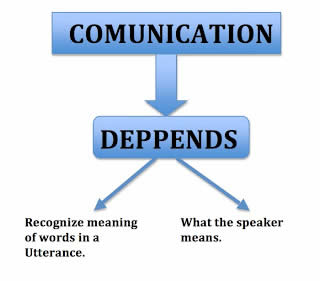Difference between Semantics and Pragmatics
Key Difference: Semantics and Pragmatics are branches of Linguistics. Semantics deals with the study of meaning of word without the context. On the other hand, Pragmatics understands the language meaning but keeping the context in mind.
.jpg) The word Semantics is derived from the Greek word semantikos meaning to show or give signs. Semantics is the study of meaning. It covers a lot of study areas related to language. Semantics help in getting a sense of meaning in context to speakers, writers, readers of learners. It also helps in known that how the meanings got change over a period of time.
The word Semantics is derived from the Greek word semantikos meaning to show or give signs. Semantics is the study of meaning. It covers a lot of study areas related to language. Semantics help in getting a sense of meaning in context to speakers, writers, readers of learners. It also helps in known that how the meanings got change over a period of time.
William Frawley defines linguistic semantics as "the study of literal, decontextualized, grammatical meaning". Semantics is concerned with the conceptual meaning related to words. Semantics does not focuses on the context, rather it deals with the meaning according to grammar and vocabulary. The focus is only on the general rules used for a language.
 Pragmatics is a different discipline in linguistics from Semantics. Semantics is all about question of meaning, whereas Pragmatics is all about questions of use. It deals with that aspect of meaning which is dependent on the context. Semantics deals with the sudy of what signs denote. On the other hand, Pragmatics deals with the relation of signs to their users and interpreters.
Pragmatics is a different discipline in linguistics from Semantics. Semantics is all about question of meaning, whereas Pragmatics is all about questions of use. It deals with that aspect of meaning which is dependent on the context. Semantics deals with the sudy of what signs denote. On the other hand, Pragmatics deals with the relation of signs to their users and interpreters.
Pragmatics makes uses of three major communication skills like using language, changing language and following rules.
Using language in context to different purposes like for greeting one uses words like “hello”. Changing language is all about the change in language which is based on the needs of a listener or situation. For example- the way one tells an instruction to a child than to an elderly person. Following rules is about the rules of conversations or in storytelling like one rephrases if the listener is not able to grasp the orator.
Semantics is limited to the relation of words to which they refer, whereas pragmatics covers the study of relationships between words, the interlocutors and also the context.
Comparison between Semantics and Pragmatics:
|
|
Semantics |
Pragmatics |
|
Definition |
Semantics is a term which is derived from the Greek word seme meaning sigh. Semantics is another important field related to theoretical linguistics. It is all about studying the meaning of linguistic expressions. |
Pragmatics understands the language meaning but keeping the context in mind.
|
|
Focus |
Meaning |
Language Use |
|
Scope |
Narrow as it deals with only meaning |
Broad as it deals with aspects beyond text |
|
Meaning of an utterance |
Context independent |
Context dependent |
|
Governed by |
General rules |
Principles |
|
Domain |
Grammar |
Rhetoric |
|
Example |
Semantics deals with the conditions under which the proposition expressed by a sentence is true. These are known as truth-conditions.
‘The red cup is on the table’ is True if and only if the red cup is really on the table. |
The sentence ‘It is very cold’ by the speaker may mean that temperature is low (semantic approach), or some other explanation. A Pragmatic may also like to consider that may be the speaker wants to switch on the blower and used the statement “it is very cold” as an associated sentence. |
| A typical question | Is an utterance true? | Is the utterance appropriate in a given situation? |
Image Courtesy: iayl.org, blogspot.in









Add new comment